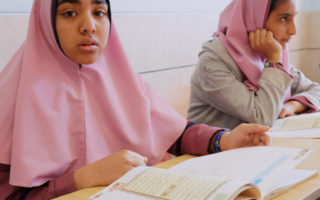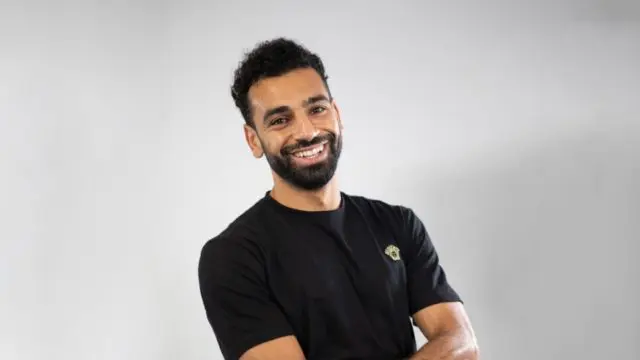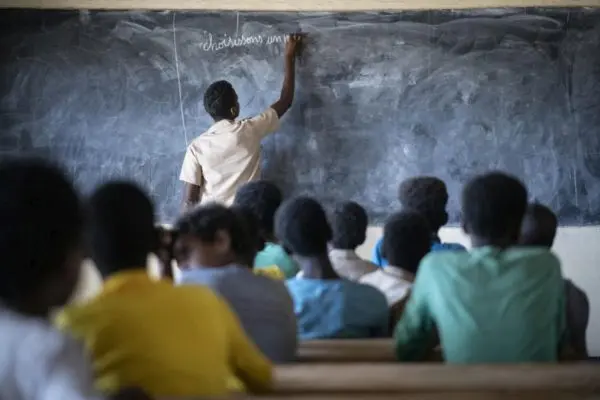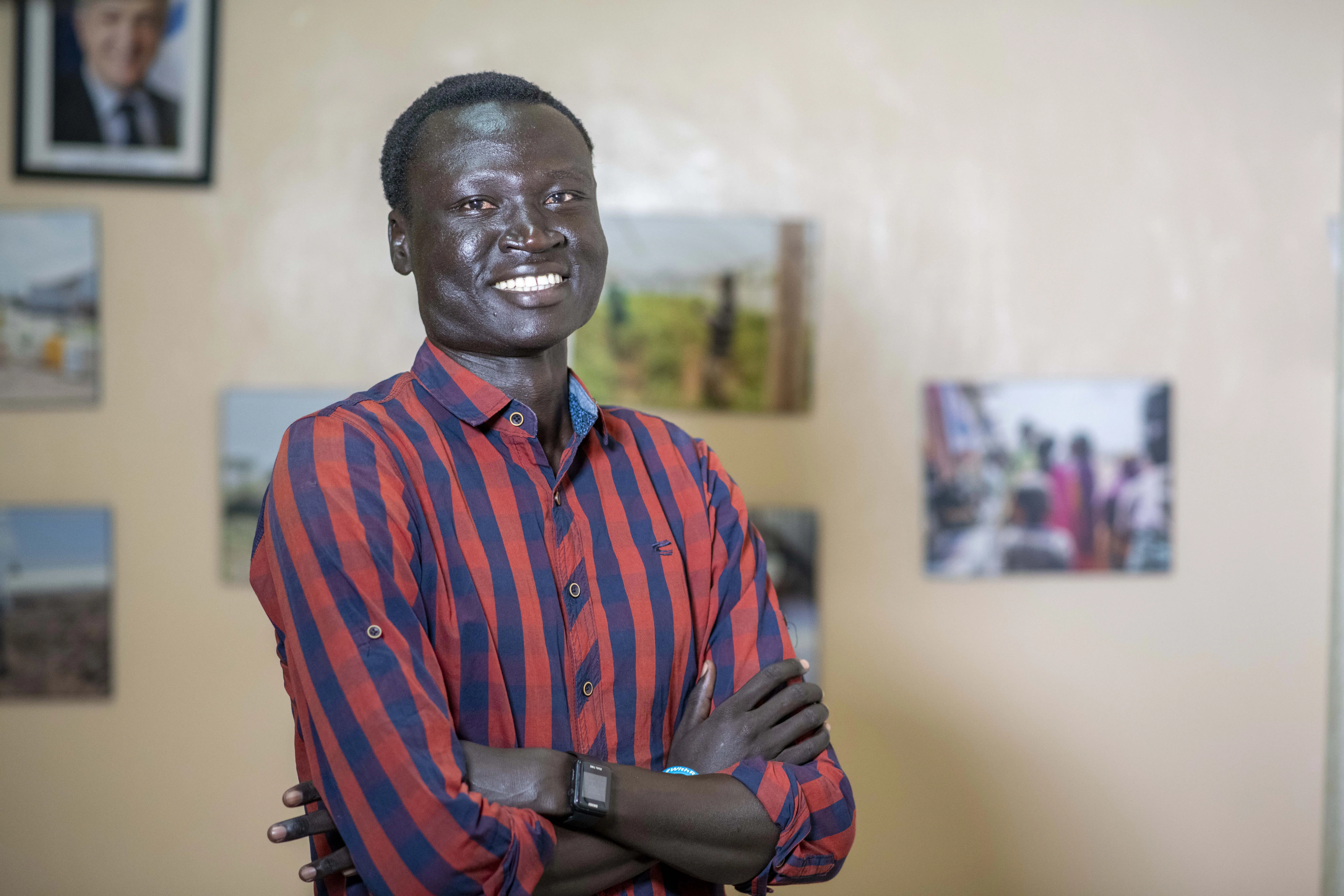
Nhial Deng is a South Sudanese refugee living in Kenya’s Kakuma refugee camp. “In school, I was able to find solace, hope and healing.” © UNHCR/Samuel Otieno
To understand the challenges refugee students faced as the coronavirus swept around the world, we asked two members of the Canada-based Refugee Education Council – one in Lima, Peru, and one in Kakuma Refugee Camp, Kenya – to quiz each other about how they had reacted, adapted and persevered despite the constant disruption to education.
Nhial Deng, aged 22, fled to Kakuma in 2010 after an armed attack on his village in Ethiopia. Among his many other projects, he heads the Refugee Youth Peace Ambassadors in Kakuma, an initiative promoting peaceful coexistence between communities in the camp and empowering young people as peacebuilders and social entrepreneurs. He will start university in Canada this academic year.
Yvana Portillo, aged 15, fled Venezuela with her family in 2017. Now in Lima, Peru, she has thrived in her new surroundings, overcoming hunger and a lack of money to shoot to the top of her class in high school, emerging as an advocate for accessible, quality education.
Nhial : Did you have what you needed for virtual classes?
Yvana: Not at first. We had a cell phone and a laptop but my parents are teachers and they needed the laptop to teach classes and share their screen and all that. My brother and I just had the phone. Then there was a week and a half when we didn’t have electricity. We went to my mother’s friend’s house so we could attend class and my parents could teach. Luckily they were able to buy another phone. How about you? You said you had no internet or electricity…
Nhial : I would go to a cyber café – they [the course organisers] set up a Google classroom and sent us content, documents and videos, so we could download it and watch offline – I was lucky enough to have a computer, which most refugees here don’t have, and FilmAid provided us with data bundles.
So I would download that content and wait until everyone was sleeping at home so I could take time to study.
Did you manage to adapt to online learning?
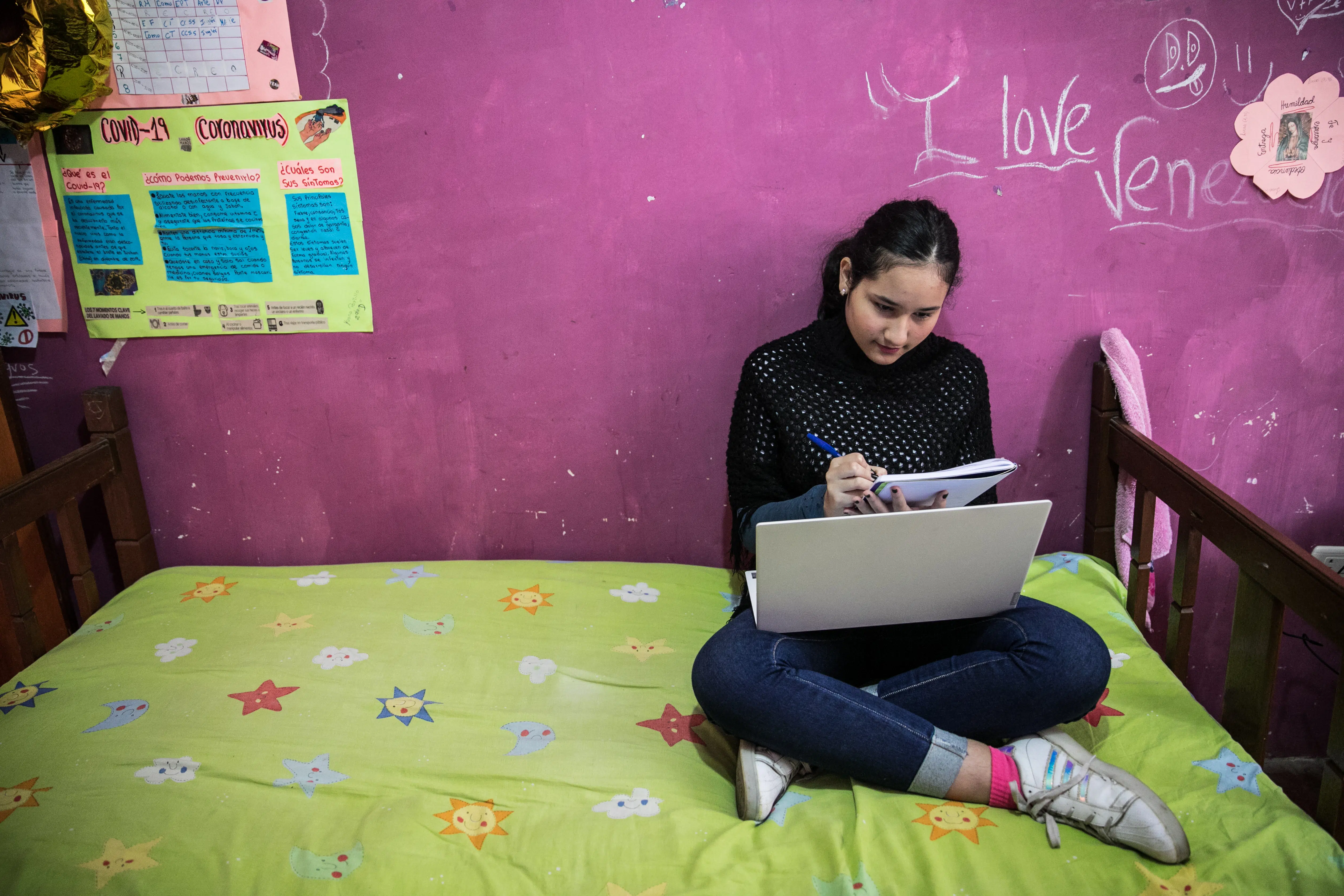
Yvana Portillo, a 15-year-old Venezuelan refugee, studies in her bedroom at her home in Lima, Peru.
© UNHCR/Sebastian Castañeda
Yvana : We have a tutor who guides us through online classes. But our teachers were the ones having issues – they were not as used to online life as us [students], they weren’t sure how to turn on their microphones or cameras or share their screens. But they’ve learned. They may not be as used to technology as we are, but it’s been over a year now so they are more used to it. How did you manage to stay motivated?
Nhial : My journalism course trainer helped me a great deal – she is Kenyan and I was very close to her. I like to reach out to people I trust, who I know can help me navigate any challenges. So I would give her a call or send a text every day.
One of the pieces of advice she gave me, which was very valuable, was that there are very limited opportunities in this world and everyone is competing for them. So she told me to be very forceful, go for the best in every situation. And that’s what I’ve been doing, trying to find ways of propelling myself to new heights.
Are you looking forward to going back to school?
Yvana : Yes! I would choose to go to school 1,000 times over virtual learning. You study more. Or the internet connection [at home] sometimes drops and that stops you. But I have to say I’m getting better grades now than when I went to school! I think it’s because I can do more research on the internet, look for videos on YouTube that explain the things I have to study. I have my parents close to me and they can help with my homework. So I’m able to find information better.
Nhial : So should digital learning play more of a role in education, even after the pandemic?
Yvana : Yes – learning should be “dual”. Digital tools can help us a lot in school. If I could make a recommendation to governments, it would be to provide refugee learners with the resources they need, and that includes access to digital information.
Nhial : I agree, though I look at this from two angles. First, I think school should continue – thinking of my own journey, when I first got to Kakuma I was lost, I was devastated, I was frustrated. I had nightmares about the violence I’d witnessed when fleeing my village in Ethiopia. In school, I was able to find solace, to find hope and healing. It was a safe place where I could think about a glowing future. And I saw so many other young people from different places and who had endured so much, and they were getting an education because they believed it was their ticket to a brighter future.
So I believe that physical school is something that should be [available]. But I also think there is need for an element of digital learning. Education should be an opportunity for people from different parts of the world to gather and learn together.
An opportunity for someone in North America to get to know someone who is in Kakuma, someone in Kakuma to get to know someone in Europe. Every single school should be connected to the internet, to enable people from different backgrounds and places to share ideas and knowledge – and to make friendships.
About the Council: The Refugee Education Council, hosted by World Vision Canada, was launched by the government of Canada in February 2021 as part of a campaign called Together for Learning. The council was set up in consultation with the Canadian International Education Policy Working Group, a network of development partners seeking to advance education for vulnerable children and youth. Members of the council comprise students, teachers and community leaders who are living as forcibly displaced persons or in host communities.
This story was originally published in UNHCR Education Report 2021: “Staying the course” – the challenges facing refugee education.



